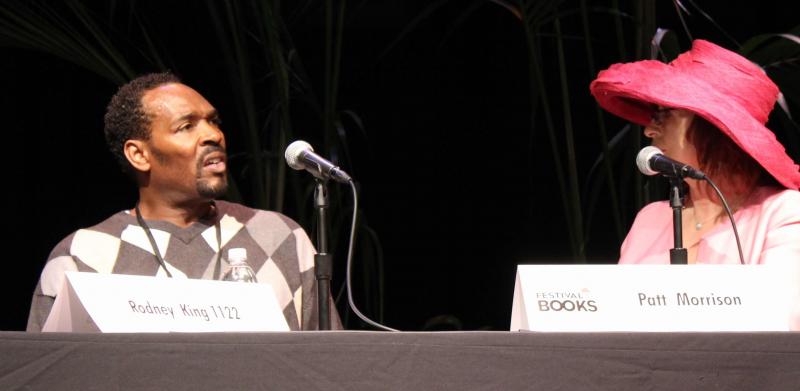L.A. Riots: Rodney King Reflects On 20th Anniversary
This story is part of a special Neon Tommy series revisiting the upheaval 20 years ago surrounding the Rodney King trial. See more of our anniversary coverage here.

“I was one of the lucky ones,” King said, adding of that fateful day, “It was a blessing the camera was there.”
King discussed everything from the beating and the trial to the actual riots while promoting his memoir, “The Riot Within: My Journey From Rebellion To Redemption” during an interview with Los Angeles Times op-ed columnist Patt Morrison at the Los Angeles Times Festival of Books this weekend.
The amount of notoriety King received before and after the LA riots has overshadowed nearly everything else in his life. He has been cast, after all, as a symbol of the riots that engulfed the city in 1992. That is something King admits he was not ready for.
“When I was a little younger, when it happened to me in my younger age, it was a scary feeling,” he said.
On the night of March 3, 1991, King was driving at high speeds with two passengers on the 210 freeway when LAPD officers pulled over him over. Drunk but unarmed, he was tasered, kicked and beaten numerous times with batons for not cooperating. The whole incident perhaps would not have even made the evening news if not for the fact that a civilian bystander caught the entire beating on tape. The video became a worldwide phenomenon, and four of the officers were subsequently tried for excessive force. A jury ultimately acquitted the men—three white and one Hispanic—sparking the riots in South Central LA on April 29, 1992.
Widespread assault, arson and looting ensued in the city following the verdicts. Dozens were killed and more than a thousand were also injured during the riots.
“Why can’t we all just get along?” King famously asked reporters during this period.
King admits he hasn’t always coped with the fame and notoriety that followed —he’s been arrested on other occasions and has battled alcoholism, which he publicly dealt with on reality television shows “Celebrity Rehab with Dr. Drew” and “Sober House”—but insists after all these years he’s doing fine now.
“I’m doing well, I’ve gotten at peace with myself,” he said.
He also told the audience he has forgiven the officers accused of beating him, despite the extent of his injuries, and the fact that to this day he still has medical bills related to the incident.
“That’s how I was raised, to be in a forgiving state of mind,” he said. “I've been forgiven many times, and I'm only human, so who am I not to forgive someone?”
The panel was fairly short—King was on stage for perhaps less than 25 minutes—because he arrived roughly 40 minutes after it was scheduled to start. He said Los Angeles traffic was to blame. The crowd, however, was far from restless. In the interim, Morrison conducted an informal, town-hall style meeting that was spirited, lively and thought provoking. Audience members discussed everything from their recollections of the riots, to whether things had changed in the city. On this point, audience members were divided.
One woman who was on the USC campus the day the rioting broke out said she thought things had changed for the better. “I think at least in this community, I think it has.” The woman added, “I think we have a long way to go.”
“I believe things have not changed,” said one woman, who lived on 64th and Normandie, which is near the epicenter of the riots, when they started. While she no longer lives in the area, she does visit it occasionally and said, “It’s even worse than the status quo at the time.”
When pressed by Morrison if things were better or worse than they were 20 years ago, King said he believed that, for the most part, things have changed for the better. “Are we better today or worse?” “I would have to say that things are better each and every day, you have to look at the history of where we’ve come from as a whole in this country, and the work that went into it over the years.”
He added: “As far as coming a long ways, I think we have come a little ways. We’ve got a long ways to go, like Martin Luther King said, and when it comes to race relations we should always be working on that in this country because of our history of it.”
As the panel concluded, King had one final thought to add.
“And remember one thing: yes we all can get along.”
Reach Deputy Editor Tracy Bloom here.
See below for video coverage from ATVN of another riots-related event at this year's L.A. Times Festival of Books.
For complete coverage of the Los Angeles Times Festival Of Books, click here.
RELATED STORIES:
A Timeline Of Events Set Off By The Rodney King Beating
Rev. Cecil Murray Sees Progress In Inclusive Society



